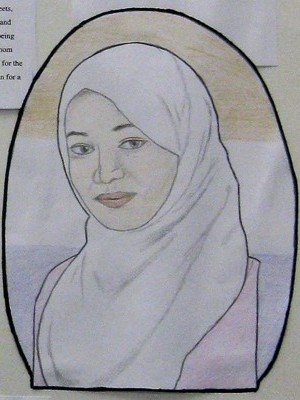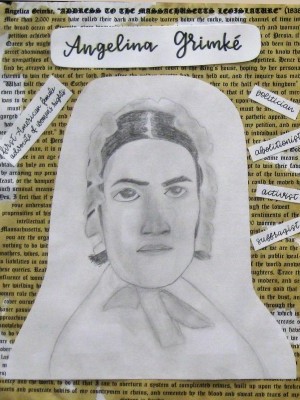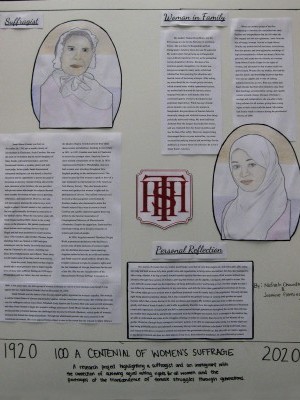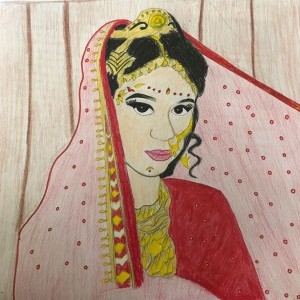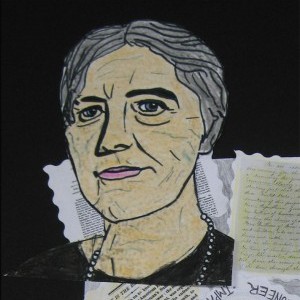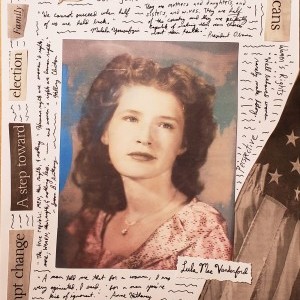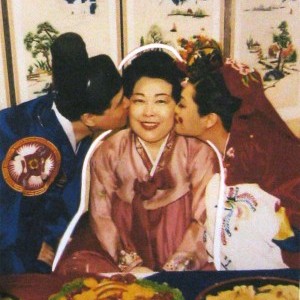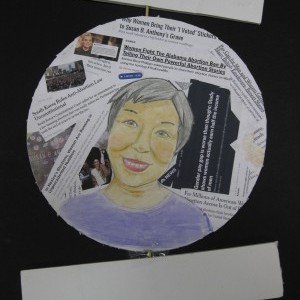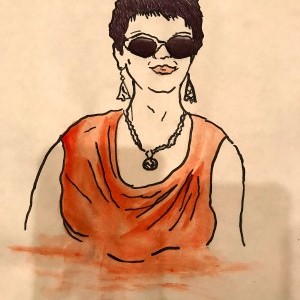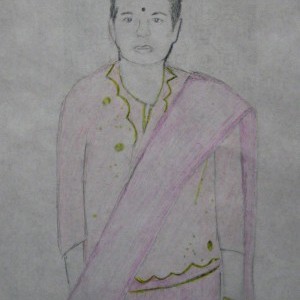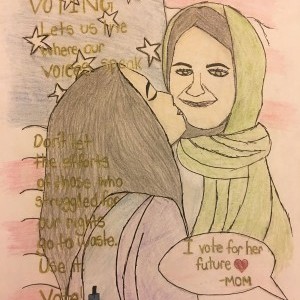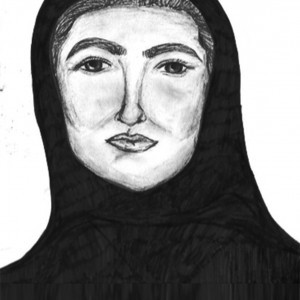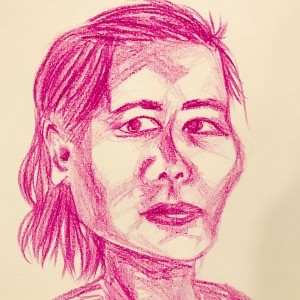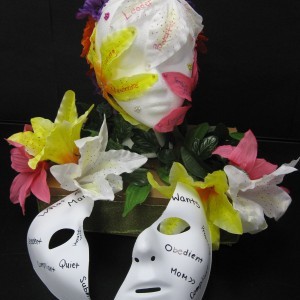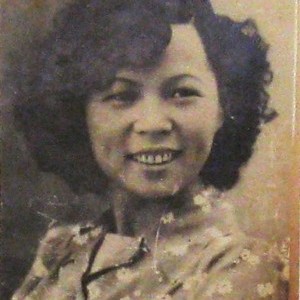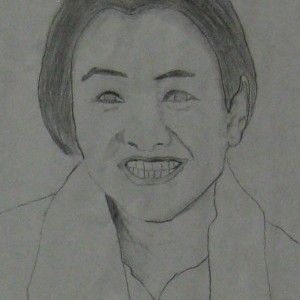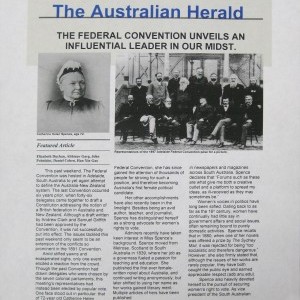Nafisah Chowdhury, Jasmine Fleming & Nishat Ahmed
Townsend Harris High School | Flushing, NY | 11th Grade
Inspirational Family Member
My Mother
My mother, Tarana Chowdhury, was the first woman to vote for the first time in my family history. She was born in Bangladesh and had immigrated to America when she was 20 years old. My mother states that growing up in Bangladesh was a difficult experience for her, as the patriarchal society dictated her identity. Because of the enormous gender inequalities, my mother was always encouraged to marry early, which had inhibited her from pursuing her education and desired career of becoming a lawyer. After asking my mom about the two female prime ministers, which seemed ironic within a patriarchal society, my mother had illustrated the heinous crimes ranging from rape to acid attacks, that were committed against women to disempower and perpetuate dependence. While having a female prime minister was a success for women in Bangladesh, the perceptions of females failed to drastically change and inhibited women from being politically active and voting. My mom had been sheltered from the dangers that lurked the streets, and was restricted from her future in politics and law for fear of her safety. However, despite being discouraged from everyone around her, my mom recounts her undying interest and thirst of knowledge for the politics in a country where she strived to be in for a better future: America.
When my mother speaks of her first immigrating to America, she remembers the same freedom and independence that she felt when she first stepped into her new apartment, away from the fear of being a woman. Similar to the Grimké sisters, my mother had left her home, moved away from her parents, and went against her teachings of typical womanhood to follow her dream, follow her passions, and create her own identity as a woman. Sarah Moore Grimke fought for the rights of women, and advocated so that women could vote and be heard. Women like my mother, who had the passion, desire, and knowledge to prove that they were just as capable and worthy of making informed decisions as men. Both my mother and Sarah Grimke had built their identities away from their teachings as independent, strong, and capable women moving towards change. Because of Grimke’s courage and independence, she was able to help bring reforms for all women, giving them voting rights so their voices could be heard. My mother had finally voted in America during the presidential election of 2008.
Historical Figure I Admire
Sarah & Angelina Grimké
Sarah Moore Grimké was born on November 26, 1792 into a wealthy family of slaveholders in Charleston, South Carolina. She was the sixth of 14 children and the second daughter of Mary Smith, a devoted homemaker, and John Faucheraud Grimké, a wealthy planter and state court judge. In her youth, Sarah demonstrated substantial intelligence yet was denied a classical education and the opportunity to pursue her goal of becoming an attorney. Instead of being allowed the same education as her brothers, she was provided with private tutors who taught her subjects deemed more suitable for women to learn such as painting, embroidery, and harpsichord. However, she was still interested in learning the subjects boys were taught in school. Grimké started to feel confined in her role and eventually developed a connection to her family’s slaves.
When she was twelve years old, Sarah began teaching Bible classes to the young slaves on the plantation. Her parents condemned these lessons since teaching slaves to read was illegal and had been prohibited in South Carolina since 1740. Grimké‘s older brother, Thomas, began attending Yale Law School in 1805 and upon returning to visit his family, he would teach Sarah what he’d learned in his classes, including new ideas about Enlightenment and religion. These ideas would inspire some of her later work as an activist.
From her youth, Sarah believed that religion should take a more proactive role in improving the lives of those who suffered. During an 1819 trip to Philadelphia with her father, she met members of the Quaker religion. Grimké admired their ideas about women and abolition, deciding to move there in 1821. In 1827, Grimké went back to Charleston to remove her younger sister, Angelina, from the close-minded communities of the South. In 1829, Angelina joined Sarah in Philadelphia, and soon both women were traveling throughout New England speaking on the abolitionist circuit. The sisters became the first women to speak in front of a state legislature as representatives of the American Anti-Slavery Society. They also became active writers and speakers for women’s rights and the abolishment of slavery. Their efforts were not well received as their pamphlets were burned by Southern leaders who threatened to arrest the Grimké sisters if they were to return to South Carolina and a public statement against them was written by the General Association of Congregational Ministers of Massachusetts (Alexander). Despite the opposition, Sarah and her sister kept writing about the poor treatment of women and enslaved people.
In 1838, Angelina married Theodore Dwight Weld, a prominent abolitionist who had been a severe critic of their inclusion of women’s rights into the abolition movement. Upon marrying, Angelina retired to her role as a wife and mother and Sarah ceased to speak publicly. Despite this, Grimké continued to fight for women’s rights and the fair treatment of African Americans for the rest of her life. She was the vice president of the Massachusetts Woman Suffrage Association in 1868. A few years later, she led a group of women in Boston to vote in a local election even though it was against the law. Sarah Moore Grimké died on December 23, 1873.
Sarah Grimké was the author of the first developed public argument for women’s equality. She worked to rid the United States of slavery and prejudice against African Americans and women. Her writings paved the way for suffragists such as Lucy Stone, Elizabeth Cady Stanton and Lucretia Mott who used several arguments and ideas from Grimké to begin the women’s suffrage movement. Sarah Moore Grimké is was not only an abolitionist but a feminist because she challenged the Society for Friends (Quakers), which spoke of women’s inclusion but denied her clergical positions. Through her abolitionist pursuits she became more sensitive to the restrictions on women. She even opposed being subject to men to the extent that she refused to marry (Durso).
SOURCES +
What the Project Means to Me
The stories of women like my mother and Grimké were that of ones that inspire me, and many girls alike today. Not only did both women defy their gender roles and expectations in being active and defiant, but they also managed to take a step, whether it be big or small, towards gender equality between men and women. Both women defined their identities through these actions of defiance, proving that women can be capable, intelligent, and equal to a man. Not only did both women teach me the importance of being politically active and having a voice, but they taught me that I can define my womanhood and identity in my own terms, and defy the terms that a patriarchal society has set for me. The voting rights given to women were a significant historical event for nearly half of the population. Not only did this right being passed symbolized change, but it also exemplified the gradual change in viewing both genders as equal humans rather than women having to be seen as inferior and limited.
My mother’s personal story is able to connect greatly with that of Sarah Grimke’s, and is able to perfectly illustrate how the implications and occurrences of historical events and experiences of individuals are able to transcend through generations throughout the world. Not only has my mother been impacted by and directly connected with the Suffragist movement, but I, a teenager in the modern day, am able to understand and relate to the struggles of being a woman in a society that views me as less because of my gender. However, through these courageous women’s actions, I am able to understand that voting is a human right and that being politically active and informed is necessary for my voice and opinions to be heard. Voting at all local, state, and federal levels allows citizens to control not only how the government should run, but also who we want to appoint to run the government and how we want aspects of our lives — from school to healthcare — be controlled and governed.
Explore the Archive
More From This Class
Click on the thumbnails below to view each student's work.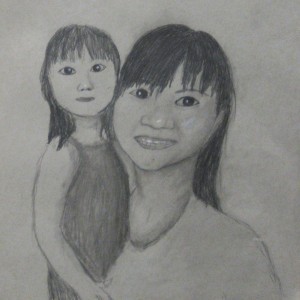
Vivian Chen, Josephine Chen, Ivan Chan, Zafirah Rahman, Neeharika Reddy, Daniel Shi, Daniel Shi, Jacqueline Cho & Osiris Guerrero

Jennifer Moran, Adebola Ademola, Julia Hong, Vicki Kanellopoulos, Inga Kulma, Maimunah Virk, Deborah Molina & Kailey Van
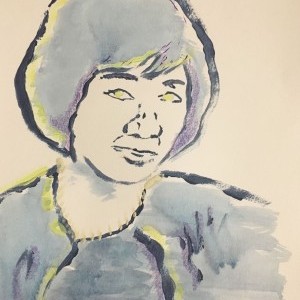
Kristina Chang, Sarah Chowdhury, Bethany Leung, Letian Fang, Cathy Choo, Kelly Chan, Emily Tan, Adamary Felipe & Kenney Son

